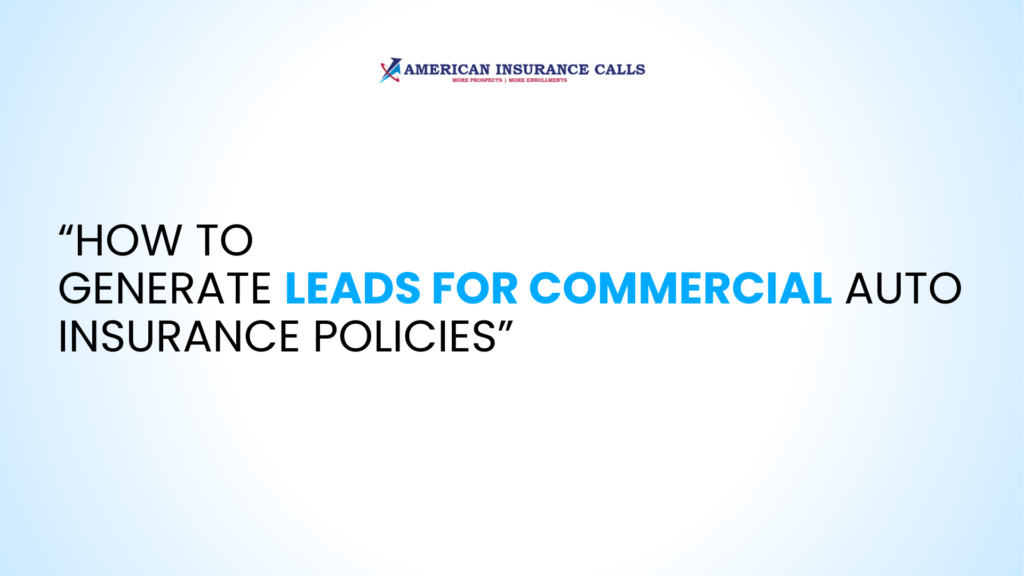Generating leads for commercial auto insurance policies requires a strategic approach tailored to the unique needs of businesses. Unlike personal auto insurance, commercial policies protect businesses and their fleets, meaning your target audience includes business owners, fleet managers, and entrepreneurs who rely on vehicles for their operations. This article will explore effective strategies and best practices to generate high-quality leads for commercial auto insurance policies and convert them into loyal clients.
1. Identify Your Target Audience
Before you can generate leads, you need to understand who you’re targeting. The commercial auto insurance market encompasses a wide range of businesses, including:
- Small business owners with a few vehicles (e.g., contractors, landscapers).
- Fleet managers for larger companies like delivery services or transportation providers.
- Specialty businesses, such as trucking companies or rideshare drivers.
Steps to Define Your Audience:
- Create detailed buyer personas that include industry type, company size, and vehicle usage.
- Research common challenges faced by businesses in your target industries, such as liability concerns or coverage gaps.
- Segment your audience by business size, location, or vehicle types to create personalized marketing campaigns.
2. Leverage Online Advertising
Online advertising is one of the fastest ways to generate leads for commercial auto insurance policies. Platforms like Google Ads and LinkedIn allow you to target your ideal audience with precision.
Google Ads for Lead Generation:
- Use keywords that indicate purchasing intent, such as “commercial vehicle insurance” or “fleet insurance quotes.”
- Run location-based ads to target businesses in specific regions or cities.
- Utilize call-only campaigns to encourage immediate phone inquiries from business owners.
LinkedIn Ads:
- Target decision-makers, such as CEOs, small business owners, or fleet managers.
- Create sponsored posts that highlight the benefits of your commercial insurance policies.
- Use LinkedIn’s lead generation forms to collect contact details directly from the platform.
3. Optimize Your Website for Lead Generation
Your website should be a lead-generating machine that provides value to visitors and encourages them to take action. For commercial auto insurance, a professional, easy-to-navigate website can make all the difference.
Key Features for a Lead-Optimized Website:
- Clear Calls-to-Action (CTAs): Use CTAs like “Get a Free Commercial Auto Insurance Quote” or “Speak with an Expert Today.”
- Landing Pages: Create dedicated landing pages for different industries or business types, such as “Insurance for Delivery Drivers” or “Coverage for Trucking Companies.”
- Forms: Use simple, user-friendly forms to collect essential information like business name, contact details, and fleet size.
Pro Tip:
Include a “Click-to-Call” button for mobile users to connect directly with your team.
4. Offer Valuable Content
Content marketing is a powerful way to attract potential leads by providing valuable information that addresses their pain points and questions. Businesses are more likely to engage with insurance providers that demonstrate expertise and thought leadership.
Content Ideas for Commercial Auto Insurance:
- Blog Posts: Write articles like “What Businesses Need to Know About Fleet Insurance” or “5 Tips for Lowering Commercial Auto Insurance Costs.”
- Ebooks or Guides: Offer downloadable resources, such as “The Ultimate Guide to Commercial Auto Insurance.”
- Webinars: Host webinars on topics like “Navigating Liability Coverage for Your Fleet.”
- Case Studies: Share success stories from businesses that benefited from your insurance solutions.
Pro Tip:
Include lead capture forms on your content pages to collect contact details before visitors access premium content.
5. Build Relationships Through Networking
Networking is a time-tested strategy for generating high-quality leads, especially in the business-to-business (B2B) space. Building relationships with other professionals can open doors to referrals and partnerships.
Networking Opportunities:
- Industry Events: Attend trade shows, business expos, or transportation industry conferences to connect with potential clients.
- Local Chambers of Commerce: Join local business groups to build relationships with small business owners in your area.
- Partnerships: Collaborate with vehicle dealerships, leasing companies, or fleet management firms to offer bundled services.
Pro Tip:
Bring business cards, brochures, or promotional materials highlighting your commercial auto insurance offerings to leave a lasting impression.
6. Utilize Social Media Marketing
Social media platforms like Facebook, LinkedIn, and Instagram can help you connect with business owners and promote your insurance policies.
Effective Social Media Strategies:
- Share educational posts about commercial auto insurance, such as FAQs or coverage comparisons.
- Highlight customer testimonials or success stories to build credibility.
- Run targeted ads promoting special offers or free consultations.
Example:
A Facebook ad campaign offering “Free Fleet Insurance Reviews for Small Businesses” can generate interest and attract qualified leads.
7. Implement Email Marketing Campaigns
Email marketing remains one of the most effective ways to nurture leads and stay top-of-mind with potential customers. Use email campaigns to share valuable insights, promote special offers, and follow up with prospects.
Email Campaign Ideas:
- Welcome Series: Send a series of emails introducing your services and highlighting the benefits of working with your company.
- Educational Emails: Share tips for choosing the right coverage or updates on industry regulations.
- Follow-Ups: Reach out to prospects who requested a quote but haven’t converted yet.
Pro Tip:
Segment your email list by industry or business size to deliver personalized messages.
8. Focus on Local SEO
Many businesses prefer to work with local insurance providers who understand their specific needs and regulations. Optimizing your website for local SEO can help you attract businesses in your area.
Local SEO Tips:
- Include location-specific keywords, such as “commercial auto insurance in [City].”
- Claim and optimize your Google Business Profile with up-to-date contact information, business hours, and photos.
- Encourage satisfied customers to leave positive reviews on Google or Yelp.
Example:
A trucking company searching for “fleet insurance in Dallas” is more likely to find and contact your business if your local SEO is optimized.
9. Use Referral Programs
Encourage existing clients or business partners to refer new customers by offering incentives like discounts or gift cards.
How to Set Up a Referral Program:
- Offer a percentage off their premium for each successful referral.
- Partner with vehicle dealerships or fleet managers to provide mutual referrals.
- Promote the program through email, social media, and networking events.
10. Leverage Call Tracking and Analytics
To maximize your lead generation efforts, use call tracking and analytics tools to measure the effectiveness of your campaigns. Understanding what’s working and what isn’t allows you to refine your strategy and allocate resources more effectively.
What to Track:
- Call volume and duration from specific campaigns.
- Conversion rates for different lead sources.
- Cost per lead and return on investment (ROI).
Pro Tip:
Use call analytics to identify high-performing keywords or channels and double down on what works best.
Conclusion
Generating leads for commercial auto insurance policies requires a multi-faceted approach that combines digital marketing, networking, and customer engagement. By identifying your target audience, leveraging online tools, and providing valuable content, you can attract high-quality leads and build lasting relationships with business clients.
Remember to continuously track your performance, refine your strategies, and stay responsive to the evolving needs of your audience. With a well-executed lead generation plan, you can grow your customer base and establish your brand as a trusted provider of commercial auto insurance solutions.

